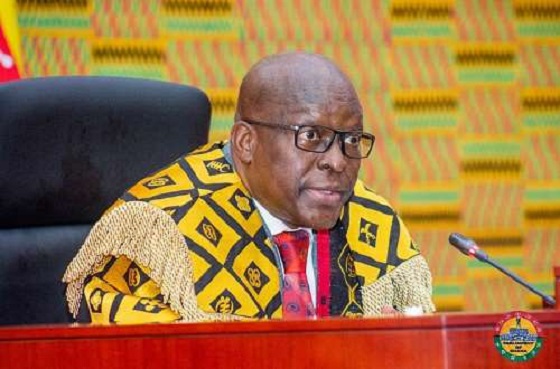
In what appears to be one of the formal responses from the Speaker of Parliament, Alban Bagbin, to President Akufo-Addo’s penchant for not assenting to private members’ bills, General Arts students, particularly those who read government in senior high school, experienced nothing but separation of powers on display.
A cursory glance at TV3 Ghana’s quote card posted on Instagram showed the Speaker’s rebuttal resonated with many of its General Arts followers, bringing back memories of their various government teachers in high school.

Some users gave high praise to these teachers for bringing them up to speed with the theory of separation of powers.

A user wrote “SEPARATION OF POWERS… part 1????????????”. Another one with the username @judiciaryj said, “Here comes the practical aspect of the theory, Separation of powers.”

What is separation of powers?
The theory of separation of powers is the division of a state’s government into branches, each with separate, independent powers and responsibilities so that the powers of one branch are not in conflict with others. Charles Baron de Montesquieu, an 18th-century French philosopher, is credited with coining the theory of separation of powers.

The three branches or arms of government are, namely, the executive, the legislature, and the judiciary. The executive arm is led by the President. The Speaker of Parliament is the head of the legislature and the Chief Justice is the leader of the judicial arm of the government.
Moreover, inherent in the theory lies the belief in checks and balances, which asserts that each of the arms of government plays a watchdog role in preventing abuse of power.
Checks are the mechanisms that allow political institutions to limit one another’s power by blocking, delaying, or simply criticising decisions.

Balances, meanwhile, ensure that a wide variety of views and interests are represented in the democratic process.
Read also:
- Parliament has no inhibition in proceeding with approval of ministerial nominees – A-G tells Speaker
The core function of the Executive, according to the Ghana Constitution, is to execute and maintain the Constitution and all laws made under or continued in force under the Constitution.
These laws are made by Parliament. Per the Constitution, the Judiciary has the sole mandate to interpret the Constitution and laws made by Parliament and assented to by the President. The Judiciary has the power to strike out laws that are at variance with the constitution.
However, in the case of Ghana, the legislature has been at the beck and call of the executive over the past years.
Until the 8th parliament, which is unique and has been described as a ‘hung parliament’, the executive always had its way because the ruling party had the majority of MPs in Parliament.
What are some limitations of separation of powers?
One of the major limitations of the practice of proper separation of powers in Ghana is the appointing powers of the President. The 1992 Constitution enjoins the executive to appoint a majority of its ministers from Parliament. This limits the power of Parliament to exercise its oversight checks on the executive fully.
In such a situation, an MP who doubles as a minister and sits in cabinet meetings would rarely dissent from the decisions from the executive for parliamentary consideration.
Also, the President has the authority to appoint the Chief Justice, head of the judicial arm of the government. Concerns are that such appointments leave the appointee at the mercy of the appointing authority.
Alban Bagbin replies Akufo-Addo
Well, the speaker of Parliament had some strong words for the President following the president’s letter to Parliament, in essence telling the speaker Alban Bagbin to respect the laws and “desist and cease” from involving him in contemptuous matters.
President Akufo-Addo, in a letter signed by his secretary, informed parliament that, upon the advice of the Attorney General, he should not take any action in relation to the anti-gay bill pending the decision of the Supreme Court on an application for injunction filed against himself and the parliament.
Nonetheless, the president in 2022 went ahead to sign the e-levy bill into law, whilst the NDC and some CSOs have filed a case against the controversial Electronic Transaction Service levy (e-levy) bill at the Supreme Court.
The Speaker did not mince words in saying that, in the spirit of respecting the rule of law, the house under his authority will not continue the consideration of the President’s ministerial nominees.
Tete-for-tat right? Yes! That’s how private legal practitioner Martin Kpebu described it.
Martin Kpebu underscored that the current constitution gives so much power to the Executive even more than anticipated, hence, the ‘impasse’ between the two arms of government bodes well for the separation of powers.
People also read:
“So on occasions like this, where Parliament also has the opportunity to extract or pull back some of the power, we should be interested in that and excited that maybe through compromises they will find a way to get a solution,” said Kpebu.
However, the human rights lawyer expressed satisfaction with the Speaker’s decision to suspend considerations of the President’s ministerial nominations.
To this end, aside from the legal tussle between the President and Parliament, General Arts students are grateful to Speaker Alban Bagbin for giving life to the theory of separation of powers.
The post Bagbin replies Akufo-Addo: Here is why General Arts students leading the conversations first appeared on 3News.
Read Full Story



















Facebook
Twitter
Pinterest
Instagram
Google+
YouTube
LinkedIn
RSS